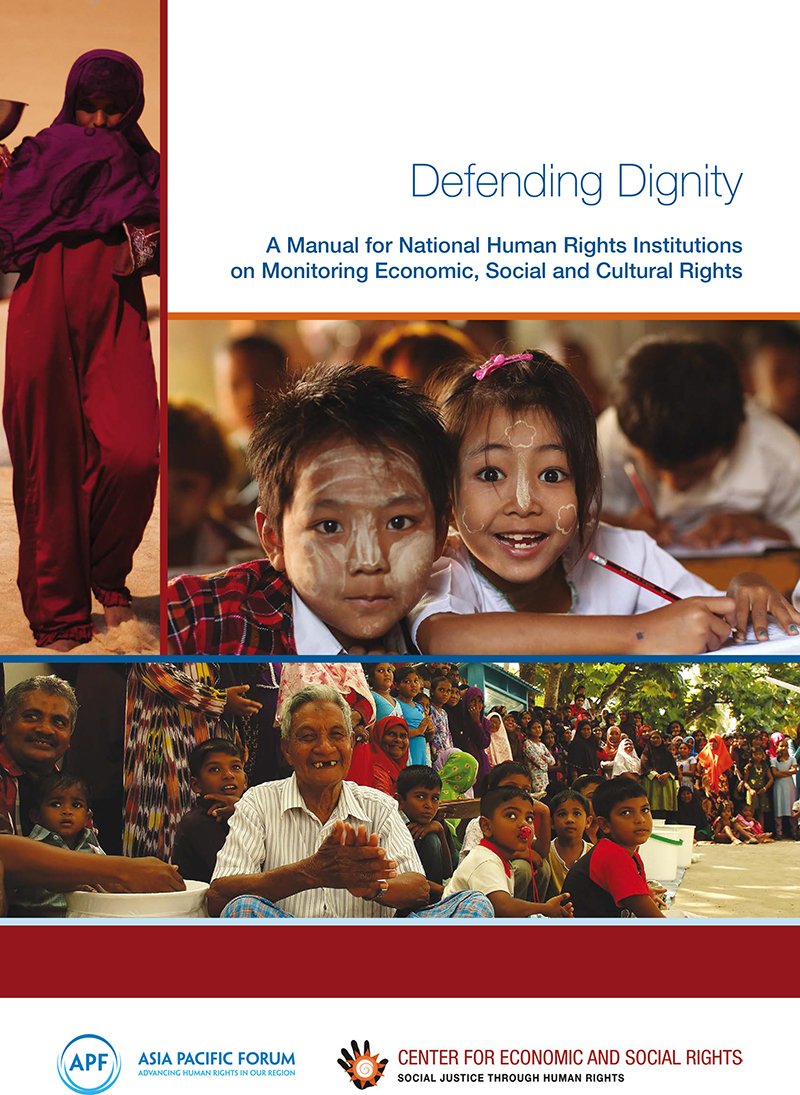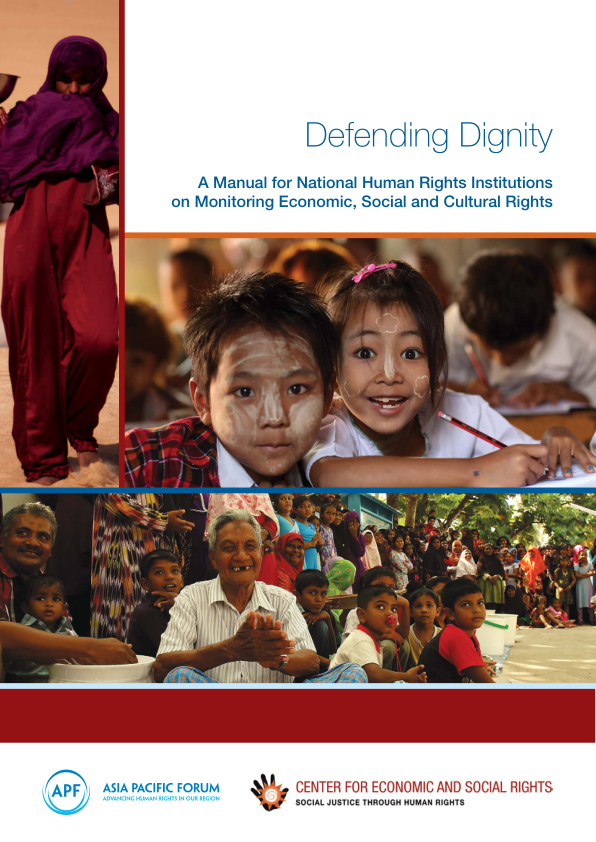 The Asia-Pacific is home to more of the world’s poor than any other region. Some 1.8 billion people face daily deprivations, including lack of food, the risk of disease, hazardous work and precarious living conditions. For this reason, National Human Rights Institutions (NHRIs) in this part of the world are redoubling their efforts to ensure their governments comply with their economic, social and cultural rights obligations, and with the recently adopted Sustainable Development Goals that reinforce these. To support them in this effort, the Asia Pacific Forum (APF) and the Center for Economic and Social Rights (CESR) are pleased to release a new manual designed to strengthen their role in monitoring and enforcing these rights.
The Asia-Pacific is home to more of the world’s poor than any other region. Some 1.8 billion people face daily deprivations, including lack of food, the risk of disease, hazardous work and precarious living conditions. For this reason, National Human Rights Institutions (NHRIs) in this part of the world are redoubling their efforts to ensure their governments comply with their economic, social and cultural rights obligations, and with the recently adopted Sustainable Development Goals that reinforce these. To support them in this effort, the Asia Pacific Forum (APF) and the Center for Economic and Social Rights (CESR) are pleased to release a new manual designed to strengthen their role in monitoring and enforcing these rights.
Defending Dignity looks at the opportunities and challenges for monitoring human rights in a development context and sets out governments’ responsibilities to create conditions in which people can enjoy their economic, social and cultural (ESC) rights. It guides readers through OPERA, CESR’s groundbreaking framework that enables human rights defenders to combine both quantitative and qualitative data to produce compelling evidence when governments fail to meet their human rights responsibilities.
While OPERA is designed to be used by a wide variety of actors, from grassroots civil society groups to government policy-makers, Defending Dignity focuses in particular on how NHRIs can use it to best effect to fulfil their monitoring, reporting and adjudication functions in the comparatively neglected area of ESC rights. It explains how these institutions can define the issues to address, collect and analyze the necessary data, make a rigorous assessment of the resource issues at stake and then deliver their findings in the most impactful way. It also includes a series of case studies, setting out how some NHRIs are already monitoring economic and social rights, along with helpful tips and exercises designed to facilitate the work of NHRI staff.
The document is divided into four parts, each of which is accompanied by a motion graphic, in which a fictitious human rights officer called Ahn puts the manual to work in her hypothetical country, and explanatory videos in which leading human rights experts from both the Asia-Pacific and beyond discuss different facets of the ESC rights monitoring process.
The Introduction unpacks the question of what is monitoring, and what should it mean for NHRIs getting to grips with economic, social and cultural rights. It covers a wide range of activities that NHRIs commonly undertake as part of their mandated functions. Having a clear sense of the different types of monitoring activities can help NHRIs decide which methodological approach will be most appropriate to support their particular area of study.
Part I then deals with defining the issues to be monitored. Every monitoring activity begins with a question. This section therefore explains how a human rights-based approach can be used to frame questions about poverty and socio-economic deprivation in a way that holds the relevant actors responsible for human rights violations. It sets out the obligations of those actors under international human rights law and, in particular, discusses the normative standards and principles that relate to ESCR. This section also introduces the OPERA framework and explains the role of indicators and benchmarks in framing research questions.
Part II of the manual tackles collecting and analyzing data. After defining the right question to ask, the next step is to collect the data that can help answer that question. This section discusses the particular advantages of integrating quantitative data in research and explains how to gather data from secondary and primary sources. This part of the manual also introduces some basic principles for analyzing data with spreadsheets.
The following section then dives into the often-challenging issue of assessing resources. Governments are obliged to dedicate “maximum available resources” to the fulfillment of ESCR. For this reason, it is especially important to consider questions about the way in which resources are generated, allocated and spent. Part III introduces the policy areas that are relevant to consider when assessing resources, before showing how budget analysis approaches can be used to investigate them.
The final section then addresses what will be the most tangible “output” of any monitoring activity – the report – examining the factors that will make it most compelling and so contribute to effective advocacy. It shows how to contextualize quantitative data with qualitative analysis and discusses how to organize findings and recommendations. It also introduces data visualization as a way to present evidence and looks at how reporting can support broader advocacy strategies.
Through these four steps, Defending Dignity addresses the particular methodological challenges of monitoring and enforcing ESC rights, and seeks to strengthen the unique role of NHRIs in ensuring accountability when these rights are violated. It was developed by CESR in consultation with a reference group composed of senior staff and Commissioners from a range of NHRIs in the Asia-Pacific Region. It grows out of CESR’s previous collaboration with the APF to support its members in New Zealand, Malaysia and Palestine, in which OPERA was deployed to situations as diverse as post-disaster reconstruction programs, the design of national development plans and access to education for children with disabilities.
- To download a copy of 'Defending Dignity' in pdf format click here.
- To view the accompanying videos and motion graphics, see here.
